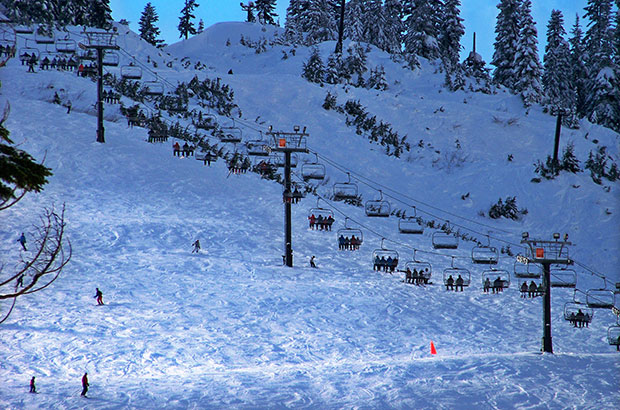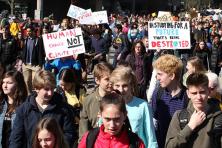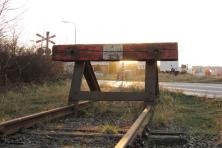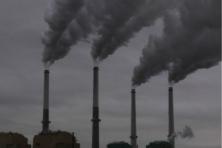It is tough times in the Cascades and other Northwest mountain ranges. While we are used to huge amounts of snow blanketing our mountains, both Oregon and Washington are in the middle of seasons that threaten to set records for low snowfall. Consider these numbers from Snoqualmie Pass, which has now shutdown for the season:
The record for lowest annual snowfall at Snoqualmie is 191 inches, in the 1976-77 season. Hyak, a resort at the pass, ended up filing for bankruptcy. Its attorney said in a Feb. 5, 1977, Seattle Times story, “The Hyak ski area has been open one day this year, and it rained the entire day.” So far this season, snow at the pass: 74 inches. Snoqualmie would need a phenomenal 117 more inches of snow to stay out of the record book. (Seattle Times - Feb 8, 2015)
So is this winter a fluke, or a glimpse of a “new normal” as the global climate warms? Although weather is always a combination of cyclical factors and broader trends, this season fits with the forecasts from climate experts, who are predicting higher snow levels, more winter rain, and dwindling snowpacks as the climate warms. We have had plenty of precipitation this winter, but it has come mostly in the form of “pineapple expresses” from Hawaii, rather than snow.
At the launch of the Washington Business Climate Declaration last fall, Tim Petrick, CEO of K2 Sports, declared that “K2 has a vested interest in the future of winter.” Same goes for hundreds of other businesses and thousands of workers in outdoor recreation – in Washington and throughout the Northwest – who depend on the changing seasons. Affected businesses extend beyond ski resorts and outdoor gear companies to include restaurants, lodging, gas stations, grocery stores, and bars. And it isn’t just recreation that is feeling the pain: low snowfall threatens all the businesses and communities that rely on abundant mountain snowpacks for adequate water supplies in the summer. This includes utilities and their customers who depend on hydropower, farmers, fishermen, and forestry industries. When the white stuff doesn’t pile up in our mountains, the risk of drought and devastating fires increases dramatically.
But many of these businesses aren’t sitting quietly. Many are raising their voices in support of action on climate, including support for Washington’s Carbon Pollution Accountability Act. And our friends at Protect Our Winters and other groups are organizing workers and players in this essential sector of our economy.
What follows is a great example of that leadership: testimony from Stevens Pass Mountain Resort, to Washington’s House Environment Committee urging the legislature to pass the Carbon Pollution Accountability Act. I have a personal reason to be proud of Stevens Pass’ leadership: it has been my home hill for over 20 years and I love its quirky charm and commitment to sustainability. I hope everyone will heed their call to take action now to protect the future of winter.
- - -
We have a saying often quoted in the Washington ski industry: “there’s no bad weather, just bad clothing.” In other words, proper preparation is everything.
While that may be true in principle, the reality on the ground can be an entirely different matter. This year, exceptionally poor conditions have led to a shortage of our number one commodity: snow. And that means our number one product –entertainment– is a lot harder to deliver to our customers.
What this translates to in numbers is pretty sobering: this year we are 125,000 visits below target and we’re already midway through the season. That’s almost 50 percent short. And that means about 50 percent less revenue, which affects payroll, leads to reduced work schedules, and shrinks the trickle-down benefit of cash injected into the local economy. Several other resorts are doing even worse.
To us, it looks like there is indeed bad weather.
So far, winters like this are still outliers in an otherwise positive history at Stevens Pass, but this glimpse of the future regional climate is disconcerting…
Climate experts have told us what to expect, and it appears that we are beginning to see it. For example, the UW’s Climate Impacts Group projects that by 2020 we will see a 2 degree Fahrenheit increase in Pacific Northwest average annual temperatures, and a 28 percent decrease in the April First statewide snowpack.
For a low-elevation ski resort, this kind of data has led us to take the climate future very seriously.
For ten years now, we have been doing everything we can to tackle our own greenhouse gas emissions, and reduce our impact on the fragile alpine environment that has provided our livelihood for over 75 years. More information is available on our website, and in our annual sustainability reports.
We have earned extensive industry recognition, media coverage, and national awards for our actions. Our surveys tell us it’s important to over one third of our guests, and recent analysis indicates our sustainability programs are worth over 100,000 dollars per year, just in branding value alone. Much more than that is saved through efficiency and resource conservation measures.
The Pacific Northwest may fare better than most of the country in adjusting to an altered climate, but after tackling this head on for a decade, we believe an even broader collaboration is needed for the most powerful response.
And we’re not going to see much meaningful action from Congress.
So a suitable program at the State level has to be part of the solution.
We support the Governor’s Carbon Pollution Accountability Act, and welcome a price on carbon.
For more information on environmental programs at Stevens Pass Mtn Resort visit:
www.stevenspass.com/environment




